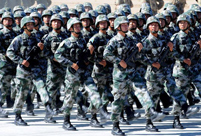 YOG kicks off in Nanjing
YOG kicks off in Nanjing
 Colorful life at Youth Olympic Village of Nanjing 2014 YOG
Colorful life at Youth Olympic Village of Nanjing 2014 YOG
 Royal Taoist temple to open to public
Royal Taoist temple to open to public
 Female soldiers at quake-hit area
Female soldiers at quake-hit area
 Shocking photos of cruel battles in Ukraine
Shocking photos of cruel battles in Ukraine
 Amphibious armored vehicle unit conducts open sea drill
Amphibious armored vehicle unit conducts open sea drill
 Water relay in Henan
Water relay in Henan
 Ethnic culture feasts eyes of travelers
Ethnic culture feasts eyes of travelers
 80 security dogs assembled in Nanjing police dog training base
80 security dogs assembled in Nanjing police dog training base
 Graffiti artists paint on street walls in Xinjiang
Graffiti artists paint on street walls in Xinjiang
MOSCOW/ASHGABAT, Aug. 28 -- The construction of energy corridor in central Asia is to enter a new stage as Chinese Vice Premier Zhang Gaoli called for further energy cooperation with Turkmenistan during his visit to the country.
China will closely cooperate with Turkmenistan in further advancing the construction of natural gas pipelines linking the two countries and jointly boost safe transportation of energy, Zhang said on Wednesday when meeting with Turkmen President Gurbanguly Berdymukhamedov.
He said China is ready to deepen trade and economic cooperation with Turkmenistan, which has given high priority to natural gas programs.
Zhang also suggested the two sides jointly develop major projects of interconnectivity, infrastructure construction and cargo transit through China's sea ports.
IMPLEMENTATION OF CONSENSUS
Zhang's trip to the central Asian country is aimed at implementing the important consensus reached by Chinese President Xi Jinping and his Turkmen counterpart Berdymukhamedov.
In the joint declaration issued during Xi's visit to Turkmenistan last September, the two heads of state pledged to take measures to guarantee a safe and stable operation of Line A and Line B of the Turkmenistan-China natural gas pipelines, as well as a sound implementation of the natural gas project on the right bank of Amu Darya, a major river in central Asia.
When Berdymukhamedov visited China in May, the two countries signed a number of cooperation agreements in such areas as energy, agriculture, transportation, finance, culture and local exchanges.
During Zhang's visit to Turkmenistan, he said the exchange of visits by presidents of the two countries within a year has elevated the China-Turkmenistan strategic partnership to a new height and made important strategic arrangements for bilateral cooperation in all areas.
At the third meeting of the China-Turkmenistan Cooperation Committee, Zhang urged the committee to strengthen strategic cooperation on energy by securing safe and stable operation of the natural gas pipelines.
The committee was established in late November 2010 aimed at promoting long-term, pragmatic and comprehensive cooperation between the two countries.
Experts said Zhang's visit will help implement the bilateral agreements reached, promote the building of the Silk Road economic belt, and deepen all-around cooperation.
CEMENT ENERGY CORRIDOR
China's cooperation with Turkmenistan is an integral part of the central Asian all-win cooperation, represented by the construction of the China-central Asia natural gas pipelines spreading on the territories of Turkmenistan, Kazakhstan, Uzbekistan and China.
The 1,830-km-long line C, parallel to Line A and Line B, started to transport natural gas to China in June at the Turkmen-Uzbek border and runs through central Uzbekistan and southern Kazakhstan before reaching China's northwest region of Xinjiang.
Line A was launched in December 2009, and Line B in October 2010. The construction of Line D is expected to be launched at the end of this year and ready for gas transmission in 2016.
By then, the combined gas transmission of the pipelines is set to reach the target of 65 billion cubic meters per year.
Vowing to develop a long-term, stable and mutually beneficial energy strategic partnership, China and Kazakhstan agreed in May to speed up the construction of more cross-border crude oil and gas pipelines.
The network of crude oil and gas pipelines has brought about substantial benefits to all the countries concerned.
The China-Turkmenistan gas pipelines have transmitted more than 90 billion cubic meters of natural gas over the past few years. China has become the top trading partner and natural gas export market for Turkmenistan for the last three years.
Meanwhile, China and Uzbekistan last week signed deals worth over 6 billion U.S. dollars, ranging from trade, loan to the construction of natural gas pipelines and treatment plants.
Central Asia is considered the world's second largest source of oil and gas after the Persian Gulf with over 30 billion tons of exploitable crude and more than one trillion cubic meters of natural gas.
Energy cooperation has prompted rapid growth of trade volume between China and four central Asian countries, namely Kazakhstan, Uzbekistan, Tajikistan and Kyrgyzstan, which increased 13 percent year on year to 40.2 billion U.S. dollars in 2013, data from China's Ministry of Commerce showed.
China's initiatives of building the Silk Road economic belt and a 21st-century maritime Silk Road were put forward by Chinese President Xi Jinping during his two separate visits to central Asia and Southeast Asia last fall.
 Special holidays
Special holidays World's top 10 fighters
World's top 10 fighters 'Stewardesses' serve in hospital
'Stewardesses' serve in hospital Beautiful night scenery of Nanjing
Beautiful night scenery of Nanjing ‘Peace Mission -2014’ joint anti-terror military exercise kicks off in China
‘Peace Mission -2014’ joint anti-terror military exercise kicks off in China Eye-catching guides at the opening ceremony of YOG in Nanjing
Eye-catching guides at the opening ceremony of YOG in Nanjing A female missile launch company of PLA
A female missile launch company of PLA China, the U.S., Britain and the Soviet Union call for Japan's unconditional surrender
China, the U.S., Britain and the Soviet Union call for Japan's unconditional surrender The biggest duty-free store of the world
The biggest duty-free store of the world Volunteers bid farewell to YOG
Volunteers bid farewell to YOG More police dogs join anti-terror campaign in Inner Mongolia
More police dogs join anti-terror campaign in Inner Mongolia Picturesque Dayilan Manchu village in NE China
Picturesque Dayilan Manchu village in NE China Athletes experience the charm of Chinese traditional opera in Nanjing
Athletes experience the charm of Chinese traditional opera in Nanjing Contestants for Miss Bikini World experience Chinese traditional culture
Contestants for Miss Bikini World experience Chinese traditional cultureDay|Week|Month